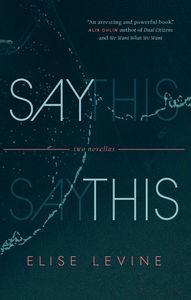February is Excerpt Month: Get Your Fill of Free Reads, including Today's Spectacular Passage from Elise Levine's Say This
We love a free peek into a great book, and this month we want to share exactly that reading joy with you, our readers. Thanks to our publishing partners, we'll be presenting excerpts from some of this season's most exciting books, incorporating different genres and literary aesthetics to make sure there is something for everyone. So prepare to find your next great read on Open Book this February!
Today we're kicking things off with an excerpt from Elise Levine's stunning, innovative work Say This (Biblioasis), in which two linked novellas function as one powerful storytelling magic trick. Formally ambitious but grounded in deep, unflinching and complex emotional truth, Say This tells the story of Eva, whose cousin has been sent to prison for murder, and Lenore-May, the stepmother of the victim. When a journalist comes knocking, prying into Eva's difficult, sexual past with her cousin, her life begins to fracture, just as Lenore-May's world is thrown into grief-filled chaos by her stepson's murder.
Devastating, beautifully and intentionally fragmented, and arresting, Say This peels back the layers of power, violence, trauma, and guilt that surround its central crime. The Globe and Mail said of Levine's work "[it's] akin to a wild ride down a dark road at night... Bold and startling... Precipitous and exhilarating.”
We're proud to present an excerpt from the beginning of the first novella, Eva Hurries Home, as a teaser for this singular and fascinating book, courtesy of Biblioasis.
Excerpt from Say This by Elise Levine:
Eva Hurries Home
Everything Has Already Happened
The fog and its clearing. The fog again, a clouded mirror. Eva’s cousin. His slender back.
Eva’s cousin, his slender back. She washes it twice. The first time, the bathroom steams. She applies the worn terrycloth to the mole near the base of his spine, as best she can make out. Just above his crack. She drips water along his neck. Exactly as his dead sister did. The knobs along his spine flex as he speaks. Eva stops. She hadn’t known about a dead sister. Exactly the same. Eva dips the cloth again into the tub. She strokes his forearms and chest. Am I hurting you? Rain hisses against the roof. Eva’s cousin falls asleep in the cooling water while she crouches on her heels. His long lashes, full lips. Sort-of moustache. The rain stops. A car crunches on the gravel drive. A car door slams. Eva closes the bathroom door behind her.
The second time Eva washes her cousin, she’s high from the bowl he offered after parking his own car. Which makes her fourteen. Or twelve. Or eleven, same summer as the first time.
Your CanLit News
Subscribe to Open Book’s newsletter to get local book events, literary content, writing tips, and more in your inbox
Sixteen would be right—when on a cloud-jammed July afternoon her cousin sweeps aside his curtain of long hair, leans across the kitchen table and plants a swift kiss. He is twenty-one. He still lives in this old house on a hill with his stepmother who works and works. His nose upturns to a point. He is slight, not tall. It’s the house that is tall, and taller that afternoon in the kitchen. The ceiling shoves up and the air thins and Eva and her cousin grow tiny, turn into small, amazing children. His laugh foams. Outside the kitchen window, the steeply serried streets of Astoria, Oregon. Whitecaps curl on the river below town. Freighters and distant forests bear crowns of mist. If she’s sixteen, it’s 1993. Let’s go for a drive.
She’s sixteen, sure. The songs he’ll write about her when he gets famous, providing he can sweet-talk his step-mother into buying that red guitar. His collection of seven silver dollars he’ll split with Eva once their value jacks. Loopy grin each time he takes his gaze from the wet road. Clogs her throat so hard it’s like dying except probably better. It’s raining hard when he turns onto an old logging road and the car shudders into the woods. Trees splash above. He brakes and turns off the engine. Smokes, pops the top on a brew. The windows glaze. The air grows thick. He hikes her thin skirt and lifts the band on the leg of her underwear with an inquisitive finger and hunches over her. Spilled beer pools on the floor mat. His cat tongue makes sticky sounds. So much rain. Eva comes hard. Really hard. He kisses her bare, beer-sticky soles. He rubs himself on her, all over her. He gentles her head down.
The clouds haul off. Purple sky. Eva’s cousin drives along the river. Just drives. The radio busted. For once Eva feels loose in herself. A new sensation. She is someone she can admire. Really something. Big girl.
After, Eva’s cousin sits propped in the tub like a pale boy-king tired from a long day of chasing puppies and tying ribbons in girls’ hair and chewing meat soaked in milk.
The white-flower cups of his knees. The bathroom window wide open, a fat moon. Eva covers her cousin’s face with the ratty washcloth. As if admiring her handiwork, she takes in his narrow chest, the delicate neck. Slick with water, his thatch of brown hair resembles the fur of a sleek animal that changes with ease. She wonders if she can. Is she already? In a strangled voice he says, Still like me?
Do you? Eva thinks, though not often, over the course of the next twenty-five years. Or twenty-eight. Or twenty- seven. She can never be sure. Her mind glazes. She only knows the affair was their last summer together, before she flew back east for the final time. Left for good. Still like me? Miss me. Think of me.
--
Eva is at work when she gets the email. It’s 2018, a cold spring. A famous journalist wants to know, can he talk to her? He lists his main credentials, but she mostly already knows who he is and the rest she quickly googles.
Twenty-five years ago, possibly around the time of Eva’s affair with her cousin, the journalist published a book on basketball as played by teens in a small town in North Carolina. The book became the basis for a movie and a tV series. Since then he has written about his designer-clothing obsession and how he hates fucking his second wife. He has written a respectful, thoughtfully inflected as-told-to with a transgender reality-tV star.
In the email the journalist is professional and polite. He’s in the research stage for a book he’s writing under contract. It’s about Eva’s cousin. Can she help?
Eva hits reply. She stares at the empty space where her standard demurral will go. She is no stranger to such requests, though they had dwindled to nothing as time wore on, as hopefuls checking family connections failed to turn up fruitful leads.
She rereads the journalist’s words. He lives in southern Washington State, not far from Astoria, Oregon, in the same coastal region her cousin once had. This is the reason, in part, for the journalist’s abiding interest. It haunted him all the while he was tied to other projects, unable to get the story out of his head. He has
tracked her down through her cousin’s stepmother, who gave Eva’s name. It took the journalist a while to figure it out, but he’s pretty sure she’s the right person. Can she confirm?
Eva is late for her afternoon meeting. She closes her laptop and pushes from her desk. She stands. Her breath clicks in her throat.
The old woman is still alive. News to Eva. She never received a response to the several letters she wrote, and the last time she checked, she can’t remember how long ago, the phone number was unlisted.
Eva tucks her laptop under her arm. She straightens her shirt collar around her suit jacket and gathers her keys and id on their lanyard.
She is halfway to the elevator bank when she realizes she pressed send on the blank.
--
Early evening. Washington, dC. Eva at forty-one. She sweeps through the downpour. Gutters choke and traffic stands still. Chins bob beneath black umbrellas. Her bare legs are chilled raw. She has trains to catch. She has terrible thoughts. Tears were shed at the afternoon meeting but not by her—not yet. The world at large also continues to exist—for now. No lunatic has yet pushed a button. Colossal fires and floods and migratory cataclysms rage elsewhere, but for now she and her world are safe.
Only the smell of damp bodies rises from the Dupont Metro entrance. Belowground she swipes her card at precisely the same moment as a stranger on her left and a stranger on her right. The turnstiles clatter open and Eva and her shadows charge through. The gates clank shut behind and, in a burst of self-consciousness or misplaced competitive spirit or an untethered fear, difficult sometimes to distinguish among them, Eva breaks ranks and bolts.
Another floor down, a worker on the opposite platform sponges a section of tiled wall where graffiti lunges in magenta. GiVe Me HeAd tiLL i’M deAd. Eva’s train roars in and she shoulders aboard.
She gets off at Union Station and locates her track for the MArC, hurries and attains an aisle seat beside an older woman playing a game on her phone. Thin humanoid
shapes spindle outside a tall clapboard house on a hill. Twilight. The woman taps the screen. A very old woman appears at the house’s front door. Another tap and a grinning ginger saunters across the porch, sits and licks its paw.
The train rumbles from the station and Eva fishes a book from her bag and tries to read. It’s snowing in Norway. A fox slips through drifts. A woman lingers beneath a streetlight, some crime to solve.
Eva can’t quite follow. She closes the book on her lap. Across the aisle a man eats a succession of breath mints from a tin. Cleaning-solvent smell. The woman next to Eva rests her wet sleeve against Eva’s and falls asleep.
Eva cannot sleep. Before she left the office, she read the journalist’s second email, apparently sent in reply to Eva’s accidental non-response. He expects she has insights. That she more than draws blanks. In sharing what she knows, she might help others to heal. For example, the family of the victim, who despite the thirteen years that have passed since the murder and the two years of trial hell continue to suffer the after effects. For example, the close friends and associates, and those the victim served over the years in his capacity as respected lawyer, champion of the underdog—these people continue to endure emotional burdens too. Despite the eleven years since Eva’s cousin began serving his sentence in a federal penitentiary in Oregon. There is still, there must be, the possibility to mend.
For Eva too, the journalist bets. He would like to know, how has she felt, what does she think, how have the murder and sentencing and serving changed her? Surely they have?
Aggravated murder, the journalist noted toward the end of this email. Her cousin lucky. Instead of the death penalty that Oregon still had at the time, he got life with no parole. His sentence the result of a deal he struck for his cooperation, which allowed the authorities to locate and recover the victim’s body. Quite the story, the journalist said.
Eva could almost hear his appreciative whistle.
The train trundles over the tracks and she rocks from side to side. Why tell her what she already knows? He strikes her as presumptuous, vaguely threatening. As if he believes he holds some kind of power over her. As if she’s in no position to refuse to cooperate.
Prick. His aggressive bullshit the same as those who preceded him. The assertion that he’s different from the rest who might have, who surely have, contacted her. The declaration that he alone wants to understand the case at granular and global levels. Will strive to unpack the legal and psychological ramifications, uncover the nuances. Get into the weeds and soar above, see a humanizing justice done for all.
Including Eva. He has set his heart on it. Wouldn’t talking to him help her too? He expects it might.
Wants, expects. Eva flushes cold. Is this guy for fucking real?
Outside the train window, platforms and commuter parking lots bubble with black water. Between stations, darkness scrawls.
The conductor announces Odenton next and Eva’s head jerks. She swipes drool from the corner of her mouth. The woman next to Eva grapples upright and she swings her legs sideways to let the woman shuffle past. Her yellowing hair brushes Eva’s cheek and she tries not to recoil.
The main lights flicker and go out. The car goes silent. Now what? the woman huffs, a dim bulk in the aisle. She peers accusingly at Eva through thick lenses that seem coated with a greasy film.
She shrugs and reopens her book, flips pages, though it’s hard to see the words clearly now.
After a minute the engine roars. The main lights switch on again and Eva’s seatmate is gone, the man across the aisle vanished.
The train lumbers forward. Sodden trees and shrubs, tentatively leafed, black the sky. Up an incline, a deer wavers in the rain.
--
Past BWi Eva stows her book in her bag and collects her dripping umbrella from between her feet, but the train idles outside the West Baltimore station, last stop before hers. No explanation for the wait is announced over the intercom but Eva suspects flooding. Expects. The waters rise often in Baltimore streets and basements, though not her own basement or street. She lives on a modest-sized hill where there is good drainage, a consideration she took into account when she bought the place two years ago—and anyway the previous owner thoughtfully, neurotically installed a sump pump next to the washer-dryer. Eva does sometimes notice seepage and mould blooms. Par for the course in the city’s ruinous humidity, but nothing like the catastrophes she sometimes reads about in the news. Sinkholes that crack open to swallow sidewalks and cars. Occasionally someone hurt or killed.
She leans back again in her seat.
Here are her own knees, knobby and chapped. Her middle-aged face shorn of detail in the vaporing window. The train jolts to life again. The shitty weather continues.
___________________________________________________
Excerpt from Say This by Elise Levine. Published by Biblioasis. Copyright 2022 by Elise Levine. Reprinted with permission.
Elise Levine’s Say This: Two Novellas is forthcoming in March 2022. She is also the author of the recent story collection This Wicked Tongue, the novels Blue Field and Requests and Dedications, and the story collection Driving Men Mad. Her work has appeared in publications including Ploughshares, Blackbird, The Gettysburg Review, and has appeared four times in Best Canadian Stories. She lives in Baltimore, MD, and teaches in the MA in Writing program at Johns Hopkins University.





